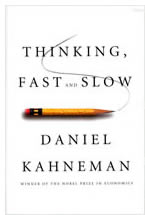 |
|
Thinking, Fast and Slow |
|
The Value of This Book
This awareness of our tendency to overconfidence, this if you will “epistemological humility,” can be a useful antidote to arrogance when interacting with others who don’t share our views. This interaction is, in turn, key to forging the broad social agreement on direction forward without which we will be unlikely to make much progress. Finally, Thinking, Fast and Slow explains why we tend to ignore or undervalue low-probability high-impact (“black swan”) events, such as being personally badly hurt by some aspect of global warming, and points us toward how to better frame such dangers in a manner more likely to sway the personal and political views, preferences, and decisions of our fellow citizens. Book Summary Daniel Kahneman, the renowned psychologist and winner of the Nobel Prize in Economics, takes us on a groundbreaking tour of the mind and explains the two systems that drive the way we think. System 1 is fast, intuitive, and emotional. System 2 is slower, more deliberative, and more logical. The impact of overconfidence on corporate strategies, the difficulties of predicting what will make us happy in the future, the profound effect of cognitive biases on everything from playing the stock market to planning our next vacation – each of these can be understood only by knowing how the two systems shape our judgments and decisions. Engaging the reader in a lively conversation about how we think, Kahneman reveals where we can and cannot trust our intuitions and how we can tap into the benefits of slow thinking. He offers practical and enlightening insights into how choices are made in both our business and our personal lives – and how we can use different techniques to guard against the mental glitches that often get us into trouble. Awards & Recognition A major New York Times bestseller, Thinking, Fast and Slow won the National Academy of Sciences Best Book Award for 2012 and the Los Angeles Times Book Prize in 2011. It was selected as one of the best books of 2011 by The New York Times Book Review, The Globe and Mail, The Economist, and The Wall Street Journal. Preview & Reviews A Google preview including the introduction and selected sections of Thinking, Fast and Slow is available here. An extensive body of book reviews is available from Google here. |
|||
![]()
Home | History & Archive | Video Productions & Services
Written Products | Products By Topic | Contact EcoIQ.com

© Copyright 1998-2023 EcoIQ







